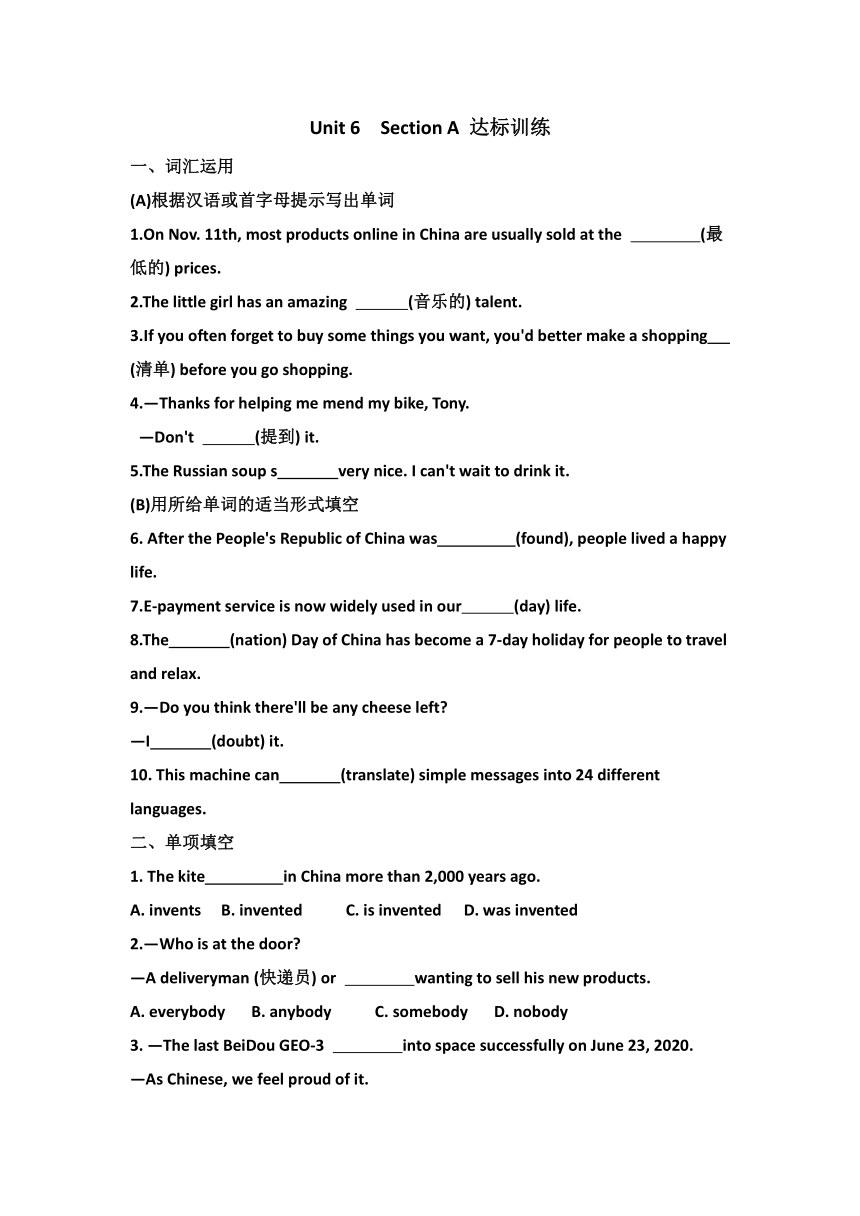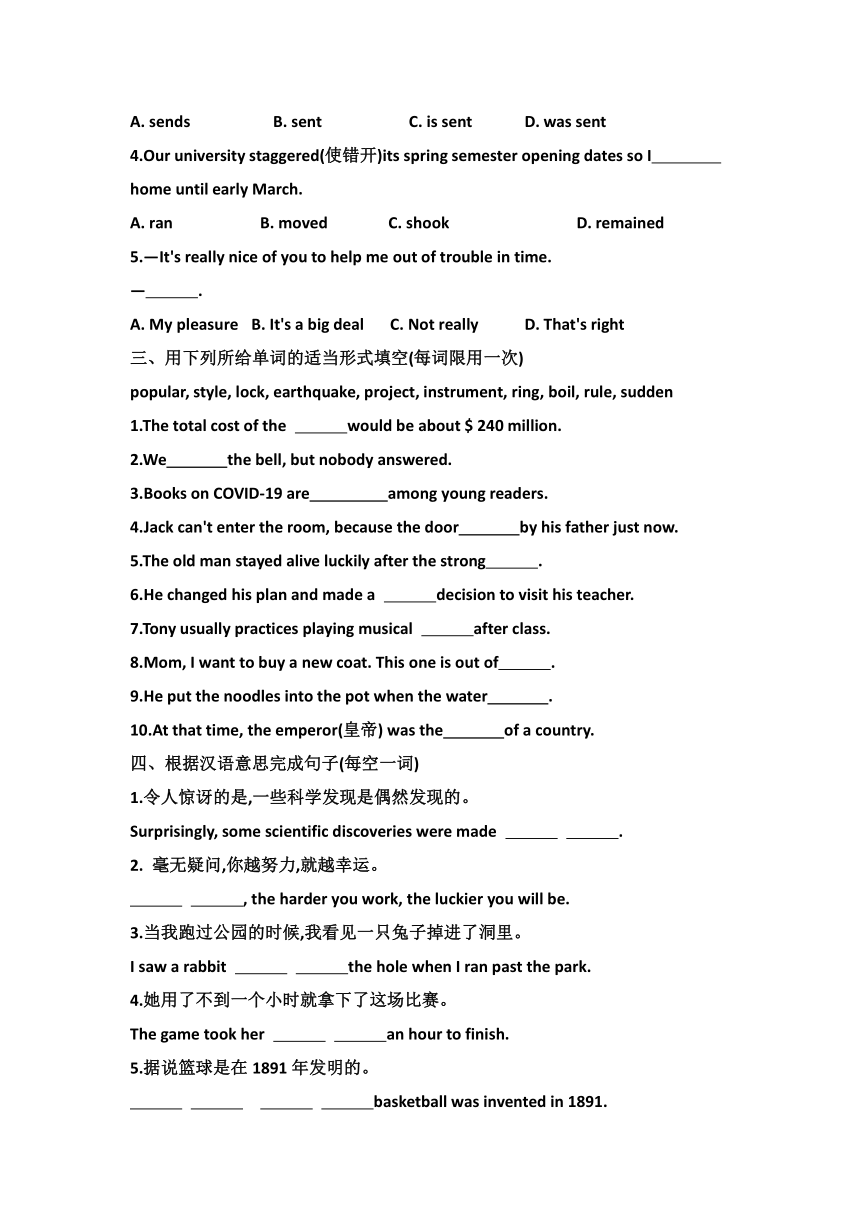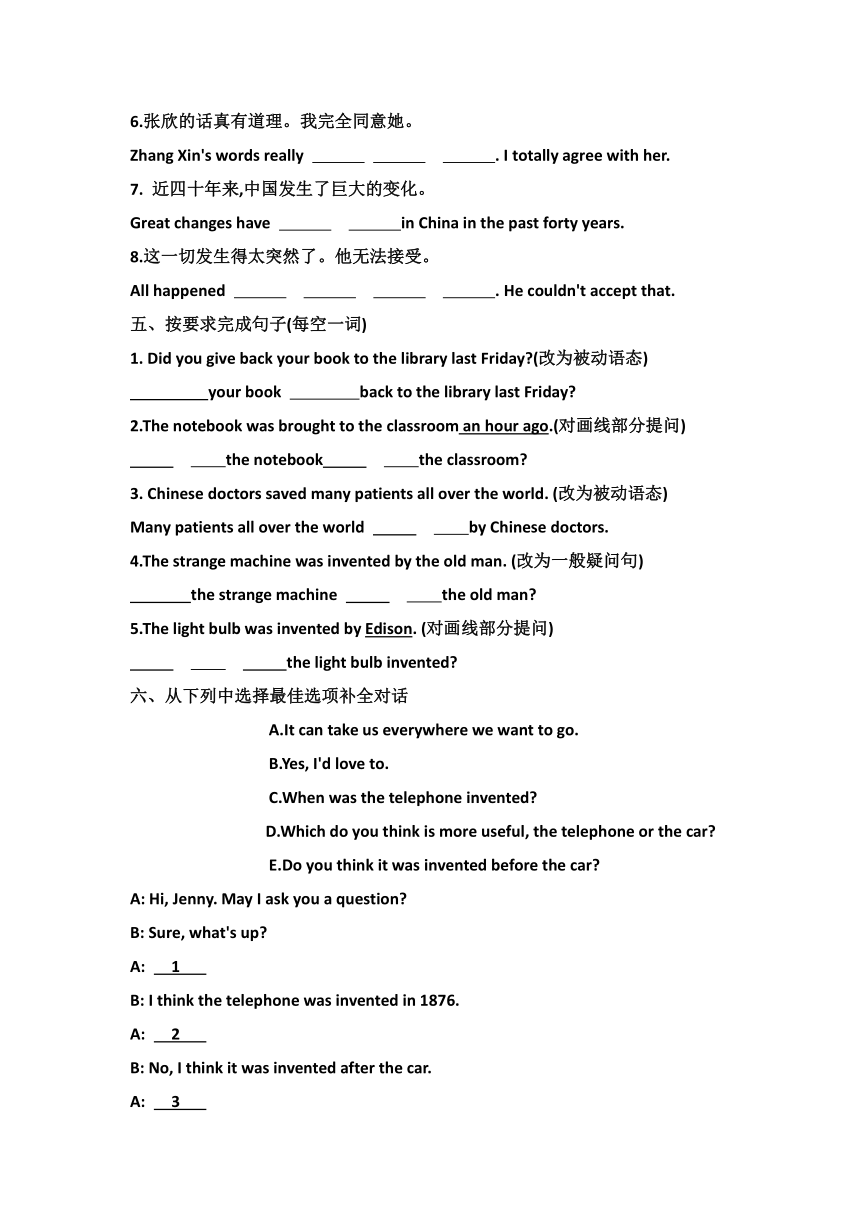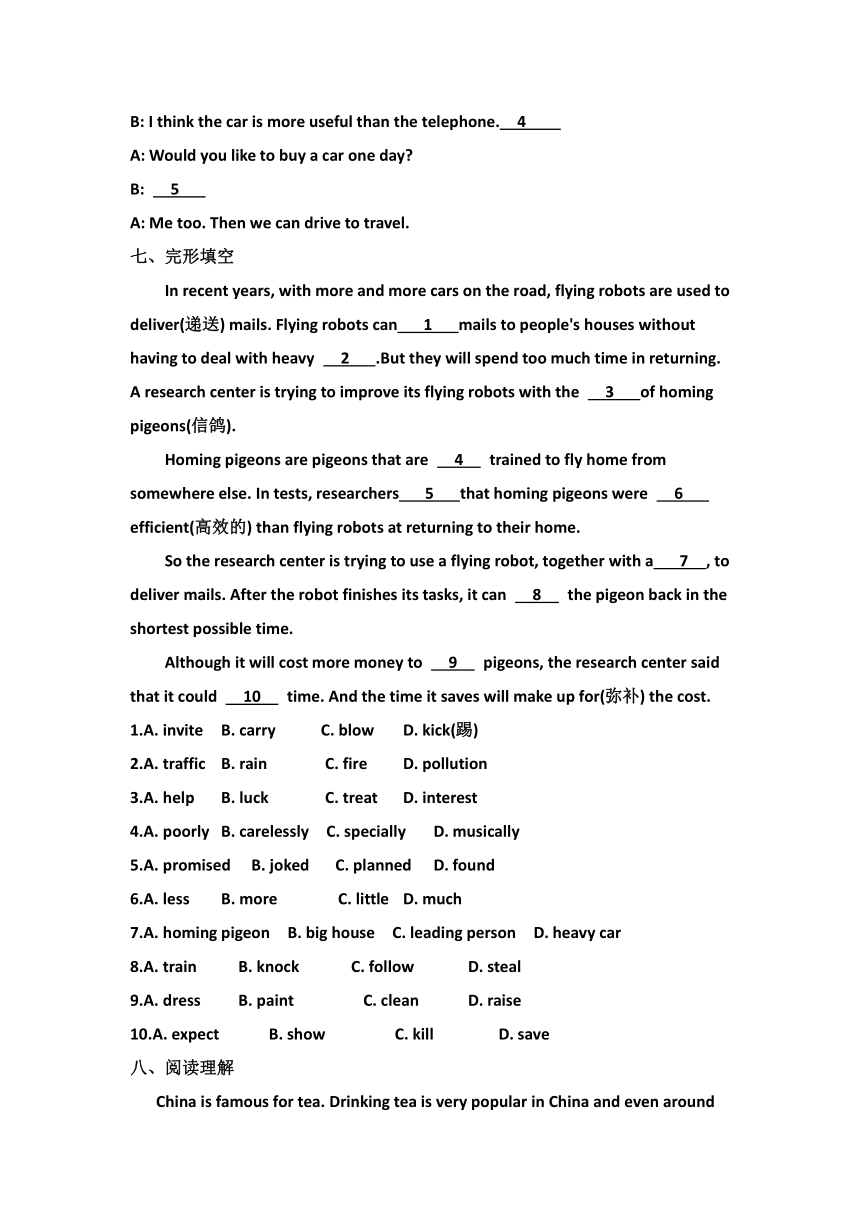人教版九年级英语全册Unit 6 When was it invented? Section A 达标训练(含答案)
文档属性
| 名称 | 人教版九年级英语全册Unit 6 When was it invented? Section A 达标训练(含答案) |  | |
| 格式 | zip | ||
| 文件大小 | 22.3KB | ||
| 资源类型 | 教案 | ||
| 版本资源 | 人教新目标(Go for it)版 | ||
| 科目 | 英语 | ||
| 更新时间 | 2021-09-09 17:28:51 | ||
图片预览




文档简介
Unit
6
Section
A
达标训练
一、词汇运用
(A)根据汉语或首字母提示写出单词
1.On
Nov.
11th,
most
products
online
in
China
are
usually
sold
at
the
(最低的)
prices.
2.The
little
girl
has
an
amazing
(音乐的)
talent.
3.If
you
often
forget
to
buy
some
things
you
want,
you'd
better
make
a
shopping
(清单)
before
you
go
shopping.
4.—Thanks
for
helping
me
mend
my
bike,
Tony.
—Don't
(提到)
it.
5.The
Russian
soup
s
very
nice.
I
can't
wait
to
drink
it.
(B)用所给单词的适当形式填空
6.
After
the
People's
Republic
of
China
was
(found),
people
lived
a
happy
life.
7.E-payment
service
is
now
widely
used
in
our (day)
life.
8.The
(nation)
Day
of
China
has
become
a
7-day
holiday
for
people
to
travel
and
relax.
9.—Do
you
think
there'll
be
any
cheese
left?
—I
(doubt)
it.
10.
This
machine
can
(translate)
simple
messages
into
24
different
languages.
二、单项填空
1.
The
kite
in
China
more
than
2,000
years
ago.
A.
invents
B.
invented
C.
is
invented
D.
was
invented
2.—Who
is
at
the
door?
—A
deliveryman
(快递员)
or
wanting
to
sell
his
new
products.
A.
everybody
B.
anybody
C.
somebody
D.
nobody
3.
—The
last
BeiDou
GEO-3
into
space
successfully
on
June
23,
2020.
—As
Chinese,
we
feel
proud
of
it.
A.
sends
B.
sent
C.
is
sent
D.
was
sent
4.Our
university
staggered(使错开)its
spring
semester
opening
dates
so
I home
until
early
March.
A.
ran
B.
moved
C.
shook
D.
remained
5.—It's
really
nice
of
you
to
help
me
out
of
trouble
in
time.
— .
A.
My
pleasure
B.
It's
a
big
deal
C.
Not
really
D.
That's
right
三、用下列所给单词的适当形式填空(每词限用一次)
popular,
style,
lock,
earthquake,
project,
instrument,
ring,
boil,
rule,
sudden
1.The
total
cost
of
the
would
be
about
$
240
million.
2.We
the
bell,
but
nobody
answered.
3.Books
on
COVID-19
are
among
young
readers.
4.Jack
can't
enter
the
room,
because
the
door
by
his
father
just
now.
5.The
old
man
stayed
alive
luckily
after
the
strong .
6.He
changed
his
plan
and
made
a
decision
to
visit
his
teacher.
7.Tony
usually
practices
playing
musical
after
class.
8.Mom,
I
want
to
buy
a
new
coat.
This
one
is
out
of .
9.He
put
the
noodles
into
the
pot
when
the
water
.
10.At
that
time,
the
emperor(皇帝)
was
the
of
a
country.
四、根据汉语意思完成句子(每空一词)
1.令人惊讶的是,一些科学发现是偶然发现的。
Surprisingly,
some
scientific
discoveries
were
made
.
2.
毫无疑问,你越努力,就越幸运。
,
the
harder
you
work,
the
luckier
you
will
be.
3.当我跑过公园的时候,我看见一只兔子掉进了洞里。
I
saw
a
rabbit
the
hole
when
I
ran
past
the
park.
4.她用了不到一个小时就拿下了这场比赛。
The
game
took
her
an
hour
to
finish.
5.据说篮球是在1891年发明的。
basketball
was
invented
in
1891.
6.张欣的话真有道理。我完全同意她。
Zhang
Xin's
words
really
.
I
totally
agree
with
her.
7.
近四十年来,中国发生了巨大的变化。
Great
changes
have
in
China
in
the
past
forty
years.
8.这一切发生得太突然了。他无法接受。
All
happened
.
He
couldn't
accept
that.
五、按要求完成句子(每空一词)
1.
Did
you
give
back
your
book
to
the
library
last
Friday?(改为被动语态)
your
book
back
to
the
library
last
Friday?
2.The
notebook
was
brought
to
the
classroom
an
hour
ago.(对画线部分提问)
the
notebook
the
classroom?
3.
Chinese
doctors
saved
many
patients
all
over
the
world.
(改为被动语态)
Many
patients
all
over
the
world
by
Chinese
doctors.
4.The
strange
machine
was
invented
by
the
old
man.
(改为一般疑问句)
the
strange
machine
the
old
man?
5.The
light
bulb
was
invented
by
Edison.
(对画线部分提问)
the
light
bulb
invented?
六、从下列中选择最佳选项补全对话
A.It
can
take
us
everywhere
we
want
to
go.
B.Yes,
I'd
love
to.
C.When
was
the
telephone
invented?
D.Which
do
you
think
is
more
useful,
the
telephone
or
the
car?
E.Do
you
think
it
was
invented
before
the
car?
A:
Hi,
Jenny.
May
I
ask
you
a
question?
B:
Sure,
what's
up?
A:
1
B:
I
think
the
telephone
was
invented
in
1876.
A:
2
B:
No,
I
think
it
was
invented
after
the
car.
A:
3
B:
I
think
the
car
is
more
useful
than
the
telephone. 4
A:
Would
you
like
to
buy
a
car
one
day?
B:
5
A:
Me
too.
Then
we
can
drive
to
travel.
七、完形填空
In
recent
years,
with
more
and
more
cars
on
the
road,
flying
robots
are
used
to
deliver(递送)
mails.
Flying
robots
can
1
mails
to
people's
houses
without
having
to
deal
with
heavy
2
.But
they
will
spend
too
much
time
in
returning.
A
research
center
is
trying
to
improve
its
flying
robots
with
the
3
of
homing
pigeons(信鸽).
Homing
pigeons
are
pigeons
that
are
4
trained
to
fly
home
from
somewhere
else.
In
tests,
researchers
5
that
homing
pigeons
were
6
efficient(高效的)
than
flying
robots
at
returning
to
their
home.
So
the
research
center
is
trying
to
use
a
flying
robot,
together
with
a
7 ,
to
deliver
mails.
After
the
robot
finishes
its
tasks,
it
can
8
the
pigeon
back
in
the
shortest
possible
time.
Although
it
will
cost
more
money
to
9
pigeons,
the
research
center
said
that
it
could
10
time.
And
the
time
it
saves
will
make
up
for(弥补)
the
cost.
1.A.
invite
B.
carry
C.
blow
D.
kick(踢)
2.A.
traffic
B.
rain
C.
fire
D.
pollution
3.A.
help
B.
luck
C.
treat
D.
interest
4.A.
poorly
B.
carelessly
C.
specially
D.
musically
5.A.
promised
B.
joked
C.
planned
D.
found
6.A.
less
B.
more
C.
little
D.
much
7.A.
homing
pigeon
B.
big
house
C.
leading
person
D.
heavy
car
8.A.
train
B.
knock
C.
follow
D.
steal
9.A.
dress
B.
paint
C.
clean
D.
raise
10.A.
expect
B.
show
C.
kill
D.
save
八、阅读理解
China
is
famous
for
tea.
Drinking
tea
is
very
popular
in
China
and
even
around
the
world.
It's
said
that
a
Chinese
ruler
called
Shen
Nong
was
the
first
to
discover
tea
as
a
drink.
A
few
thousand
years
later,
Lu
Yu,
"the
saint
of
tea",
mentioned
Shen
Nong
in
his
book
Cha
Jing.
The
book
describes
how
tea
plants
were
grown
and
used
to
make
tea.
Nowadays,
according
to
different
processing
ways,
there
are
different
kinds
of
Chinese
tea,such
as
green
tea,
black
tea,
Oolong
tea
and
scented
(有香味的)
tea.
Without
fermentation
(发酵),
green
tea
keeps
the
original
color
of
the
tea.
If
the
green
tea
is
fermented
before
baking,
it
will
be
black
tea.
Oolong
tea
is
partially
(部分地)
fermented.
And
if
fragrant
flowers
are
mixed
in
the
tea
during
the
processing,
the
scented
tea
will
be
made.
Tea
is
produced
in
many
different
areas
in
China.
For
example,
Anxi
and
Hangzhou
are
widely
known
for
their
tea.
Tea
plants
are
grown
on
the
sides
of
mountains.
When
the
leaves
are
ready,
they
are
picked
by
hand
and
then
are
sent
for
processing.
Later,
the
tea
is
packed
and
sent
to
many
different
countries
and
places
around
China.
It's
believed
that
tea
was
brought
to
Korea
and
Japan
during
the
6th
and
7th
centuries.
In
England,
tea
didn't
appear
until
around
1660.
The
tea
trade
from
China
to
Western
countries
took
place
in
the
19th
century.
Tea
is
good
for
people's
health
and
plays
an
important
role
in
Chinese
social
life.
1.Who
discovered
tea
as
a
drink
first
according
to
the
passage?
A.
Shen
Nong.
B.
Lu
Yu.
C.
Hou
Yi.
D.
Yu
Gong.
2.How
many
kinds
of
Chinese
tea
are
mentioned
in
the
passage?
A.
Two.
B.
Three.
C.
Four.
D.
Five.
3.What
does
the
underlined
word
"fragrant"
mean
in
Chinese?
A.
悦耳的
B.
难闻的
C.
难看的
D.
芳香的
4.Which
of
the
following
is
the
right
order
to
produce
tea?
①
Later,
the
tea
is
packed.
②
When
the
leaves
are
ready,
they
are
picked
by
hand
and
then
are
sent
for
processing.
③
Then
it
is
sent
to
many
different
countries
and
places
around
China.
④
Tea
plants
are
grown
on
the
sides
of
mountains.
A.
④③②①
B.
④②①③
C.
④③①②
D.
②④①③
5.When
did
the
tea
trade
from
China
to
Western
countries
take
place?
A.
During
the
6th
and
7th
centuries.
B.
Around
1660.
C.
In
the
19th
century.
D.
In
the
1990s.
答案解析
一、词汇运用
(A)根据汉语或首字母提示写出单词
1.lowest 空处所填单词作定语修饰prices,应为形容词,根据汉语提示可知此处应使用最高级,故填lowest。
2.musical 句意:这个小女孩拥有令人惊奇的音乐天赋。空处修饰名词talent,应用形容词musical。
3.list 句意:如果你经常忘记买一些你想要的东西,你最好在购物前列一张购物清单。make
a
shopping
list"列一张购物清单"。
4.mention 托尼,谢谢你帮我修我的自行车。不客气。Don't
mention
it"不客气",为固定用法。
5.smells 句意:罗宋汤闻起来非常美味。我等不及要喝了。结合句意和首字母提示可知,空处应为系动词,又因主语The
Russian
soup为不可数名词,故填smells。
(B)用所给单词的适当形式填空
6.founded 句意:在中华人民共和国成立之后,人们过着幸福的生活。根据空前的was可知,此处为一般过去时的被动语态,found"建立",其过去分词为founded。
7.daily 句意:电子支付服务现在在我们的日常生活中被广泛使用。空处应填形容词daily来修饰名词life。
8.National 句意:中国的国庆节已经变成了一个让人们旅游和放松的七天假期。the
National
Day"国庆节",为固定用法。
9.doubt 根据问句可知答语应用一般现在时,主语为I,故用doubt的原形。
10.translate 句意:这种机器能把简单的信息翻译成24种不同的语言。情态动词can后接动词原形,故用translate。
二、单项填空
1.D kite和invent之间是被动关系,应用被动语态,由此可先排除A、B两项;再结合题干中的"more
than
2,000
years
ago"可知,本题要用一般过去时的被动语态,故was
invented符合题意。
2.C
谁在门口?
一个快递员,或者某个想要卖掉他新产品的人。somebody"某人",符合题意。
3.D 最后一颗北斗GEO-3卫星于2020年6月23日被成功送入太空。作为中国人,我们为此感到骄傲。主语The
last
BeiDou
GEO-3和动词send之间是被动关系;由时间状语on
June
23,
2020可知,
此处表示发生过的事情,
故用一般过去时的被动语态。
4.D 句意:我们大学把春季开学时间错开了,所以我在家待到了三月初。表示"停留"要用remain。
5.A 你真好及时帮我摆脱困难。不客气。第一句话表达的是感谢,应用My
pleasure回答,表示"不客气"。
三、用下列所给单词的适当形式填空(每词限用一次)
1.project 句意:这个项目的总费用大约为2.4亿美元。
2.rang 句意:我们按了铃,但没有人应答。根据空后的answered可知,此处表示过去的事情,应用一般过去时。
3.popular 句意:关于新型冠状病毒肺炎的书在年轻读者中很受欢迎。
4.was
locked 句意:杰克进不去屋了,因为门刚才被他爸爸锁上了。由just
now可知,这里应用一般过去时,主语the
door是谓语动作(lock)的承受者,应用被动语态。
5.earthquake 句意:那位老人在强震后幸运地活了下来。earthquake"地震",符合句意。
6.sudden 句意:他改变了他的计划,突然决定去拜访他的老师。本句空处所填词用来修饰名词decision,故用形容词sudden。
7.instruments instrument"工具,器械,乐器",为可数名词。空前无冠词,故用其复数形式。
8.style 句意:妈妈,我想买一件新外套。这一件已经过时了。out
of
style"过时的",为固定搭配。
9.boiled
句意:当水开了,他把面条放到了锅里。根据put可知,
本句是一般过去时,故填boiled。
10.ruler
句意:
在那时,
皇帝是一个国家的统治者。ruler除了有"尺子"的意思之外,还有"统治者"的意思。
四、根据汉语意思完成句子(每空一词)
1.by
accident/chance
2.Without
doubt
3.falling
into
4.less
than
5.It
is
said
that
6.have
a
point
7.taken
place
8.all
of
a
sudden
五、按要求完成句子(每空一词)
1.Was;
given
2.When
was;
brought
to
3.were
saved
4.Was;
invented
by
5.By
whom
was
六、从下列中选择最佳选项补全对话
1—5
CEDAB
完形填空
1.B 根据上文中的"to
deliver(递送)
mails"可知,飞行机器人能够"携带"邮件,把它们送到人们家里。故所缺的词是carry。invite"邀请";blow"吹,刮";kick"踢"。
2.A 飞行机器人不必应对繁忙的"交通",故所缺的词是traffic。
3.A 根据第二段内容可推知,一个研究中心正试图在信鸽的"帮助"下改进它的飞行机器人。故所缺的词是help。
4.C 结合常识可知,信鸽是经过"特殊"训练的鸽子。故所缺的词是specially。
5.D 根据下文描述可知,设空后that引导的宾语从句的内容是研究人员在测试中"发现"的东西。故所缺的词是found。
6.B 根据下文描述可知,信鸽在返家时比飞行机器人更高效,more
efficient意为"更加高效"。故答案为B。
7.A 根据上文中多次出现的"homing
pigeons"可知,研究中心正试图用飞行机器人和"信鸽"一起来递送邮件。故答案为A。
8.C 机器人完成了它的任务之后,会"跟随"信鸽在可能的最短时间内返回。故所缺的词是follow。
9.D 此处是说,"饲养"鸽子会花更多钱。故所缺的词是raise。
10.D 结合下文中的"the
time
it
saves"可知此处是说,那可以"节省"时间。故所缺的词是save。
八、阅读理解
1.A 根据第一段中的"It's
said
that
a
Chinese
ruler
called
Shen
Nong
was
the
first
to
discover
tea
as
a
drink"可知,神农最早发现了茶可以饮用。
2.C 根据第二段中的"such
as
green
tea,
black
tea,
Oolong
tea
and
scented
(有香味的)
tea"可知,一共提到了四种茶。
3.D 根据画线词后的"the
scented
tea
will
be
made"可知,花茶被制作出来,所以,我们可推知如果把"有香味的"花混合在茶里,花茶就会被制作出来。
4.B 根据第三段中的"Tea
plants
are
grown
on
the
sides
of
mountains.
When
the
leaves
are
ready,
they
are
picked
by
hand
and
then
are
sent
for
processing.
Later,
the
tea
is
packed
and
sent
to
many
different
countries
and
places
around
China"可知,首先,茶树种植在山腰上,其次,茶叶成熟后手工采摘并送去加工;接着,给茶叶打包;最后,茶叶被运送到中国周围的不同国家和地区。
5.C 根据倒数第二段中的"The
tea
trade
from
China
to
Western
countries
took
place
in
the
19th
century"可知,从中国到西方国家的茶叶贸易发生在19世纪。
6
Section
A
达标训练
一、词汇运用
(A)根据汉语或首字母提示写出单词
1.On
Nov.
11th,
most
products
online
in
China
are
usually
sold
at
the
(最低的)
prices.
2.The
little
girl
has
an
amazing
(音乐的)
talent.
3.If
you
often
forget
to
buy
some
things
you
want,
you'd
better
make
a
shopping
(清单)
before
you
go
shopping.
4.—Thanks
for
helping
me
mend
my
bike,
Tony.
—Don't
(提到)
it.
5.The
Russian
soup
s
very
nice.
I
can't
wait
to
drink
it.
(B)用所给单词的适当形式填空
6.
After
the
People's
Republic
of
China
was
(found),
people
lived
a
happy
life.
7.E-payment
service
is
now
widely
used
in
our (day)
life.
8.The
(nation)
Day
of
China
has
become
a
7-day
holiday
for
people
to
travel
and
relax.
9.—Do
you
think
there'll
be
any
cheese
left?
—I
(doubt)
it.
10.
This
machine
can
(translate)
simple
messages
into
24
different
languages.
二、单项填空
1.
The
kite
in
China
more
than
2,000
years
ago.
A.
invents
B.
invented
C.
is
invented
D.
was
invented
2.—Who
is
at
the
door?
—A
deliveryman
(快递员)
or
wanting
to
sell
his
new
products.
A.
everybody
B.
anybody
C.
somebody
D.
nobody
3.
—The
last
BeiDou
GEO-3
into
space
successfully
on
June
23,
2020.
—As
Chinese,
we
feel
proud
of
it.
A.
sends
B.
sent
C.
is
sent
D.
was
sent
4.Our
university
staggered(使错开)its
spring
semester
opening
dates
so
I home
until
early
March.
A.
ran
B.
moved
C.
shook
D.
remained
5.—It's
really
nice
of
you
to
help
me
out
of
trouble
in
time.
— .
A.
My
pleasure
B.
It's
a
big
deal
C.
Not
really
D.
That's
right
三、用下列所给单词的适当形式填空(每词限用一次)
popular,
style,
lock,
earthquake,
project,
instrument,
ring,
boil,
rule,
sudden
1.The
total
cost
of
the
would
be
about
$
240
million.
2.We
the
bell,
but
nobody
answered.
3.Books
on
COVID-19
are
among
young
readers.
4.Jack
can't
enter
the
room,
because
the
door
by
his
father
just
now.
5.The
old
man
stayed
alive
luckily
after
the
strong .
6.He
changed
his
plan
and
made
a
decision
to
visit
his
teacher.
7.Tony
usually
practices
playing
musical
after
class.
8.Mom,
I
want
to
buy
a
new
coat.
This
one
is
out
of .
9.He
put
the
noodles
into
the
pot
when
the
water
.
10.At
that
time,
the
emperor(皇帝)
was
the
of
a
country.
四、根据汉语意思完成句子(每空一词)
1.令人惊讶的是,一些科学发现是偶然发现的。
Surprisingly,
some
scientific
discoveries
were
made
.
2.
毫无疑问,你越努力,就越幸运。
,
the
harder
you
work,
the
luckier
you
will
be.
3.当我跑过公园的时候,我看见一只兔子掉进了洞里。
I
saw
a
rabbit
the
hole
when
I
ran
past
the
park.
4.她用了不到一个小时就拿下了这场比赛。
The
game
took
her
an
hour
to
finish.
5.据说篮球是在1891年发明的。
basketball
was
invented
in
1891.
6.张欣的话真有道理。我完全同意她。
Zhang
Xin's
words
really
.
I
totally
agree
with
her.
7.
近四十年来,中国发生了巨大的变化。
Great
changes
have
in
China
in
the
past
forty
years.
8.这一切发生得太突然了。他无法接受。
All
happened
.
He
couldn't
accept
that.
五、按要求完成句子(每空一词)
1.
Did
you
give
back
your
book
to
the
library
last
Friday?(改为被动语态)
your
book
back
to
the
library
last
Friday?
2.The
notebook
was
brought
to
the
classroom
an
hour
ago.(对画线部分提问)
the
notebook
the
classroom?
3.
Chinese
doctors
saved
many
patients
all
over
the
world.
(改为被动语态)
Many
patients
all
over
the
world
by
Chinese
doctors.
4.The
strange
machine
was
invented
by
the
old
man.
(改为一般疑问句)
the
strange
machine
the
old
man?
5.The
light
bulb
was
invented
by
Edison.
(对画线部分提问)
the
light
bulb
invented?
六、从下列中选择最佳选项补全对话
A.It
can
take
us
everywhere
we
want
to
go.
B.Yes,
I'd
love
to.
C.When
was
the
telephone
invented?
D.Which
do
you
think
is
more
useful,
the
telephone
or
the
car?
E.Do
you
think
it
was
invented
before
the
car?
A:
Hi,
Jenny.
May
I
ask
you
a
question?
B:
Sure,
what's
up?
A:
1
B:
I
think
the
telephone
was
invented
in
1876.
A:
2
B:
No,
I
think
it
was
invented
after
the
car.
A:
3
B:
I
think
the
car
is
more
useful
than
the
telephone. 4
A:
Would
you
like
to
buy
a
car
one
day?
B:
5
A:
Me
too.
Then
we
can
drive
to
travel.
七、完形填空
In
recent
years,
with
more
and
more
cars
on
the
road,
flying
robots
are
used
to
deliver(递送)
mails.
Flying
robots
can
1
mails
to
people's
houses
without
having
to
deal
with
heavy
2
.But
they
will
spend
too
much
time
in
returning.
A
research
center
is
trying
to
improve
its
flying
robots
with
the
3
of
homing
pigeons(信鸽).
Homing
pigeons
are
pigeons
that
are
4
trained
to
fly
home
from
somewhere
else.
In
tests,
researchers
5
that
homing
pigeons
were
6
efficient(高效的)
than
flying
robots
at
returning
to
their
home.
So
the
research
center
is
trying
to
use
a
flying
robot,
together
with
a
7 ,
to
deliver
mails.
After
the
robot
finishes
its
tasks,
it
can
8
the
pigeon
back
in
the
shortest
possible
time.
Although
it
will
cost
more
money
to
9
pigeons,
the
research
center
said
that
it
could
10
time.
And
the
time
it
saves
will
make
up
for(弥补)
the
cost.
1.A.
invite
B.
carry
C.
blow
D.
kick(踢)
2.A.
traffic
B.
rain
C.
fire
D.
pollution
3.A.
help
B.
luck
C.
treat
D.
interest
4.A.
poorly
B.
carelessly
C.
specially
D.
musically
5.A.
promised
B.
joked
C.
planned
D.
found
6.A.
less
B.
more
C.
little
D.
much
7.A.
homing
pigeon
B.
big
house
C.
leading
person
D.
heavy
car
8.A.
train
B.
knock
C.
follow
D.
steal
9.A.
dress
B.
paint
C.
clean
D.
raise
10.A.
expect
B.
show
C.
kill
D.
save
八、阅读理解
China
is
famous
for
tea.
Drinking
tea
is
very
popular
in
China
and
even
around
the
world.
It's
said
that
a
Chinese
ruler
called
Shen
Nong
was
the
first
to
discover
tea
as
a
drink.
A
few
thousand
years
later,
Lu
Yu,
"the
saint
of
tea",
mentioned
Shen
Nong
in
his
book
Cha
Jing.
The
book
describes
how
tea
plants
were
grown
and
used
to
make
tea.
Nowadays,
according
to
different
processing
ways,
there
are
different
kinds
of
Chinese
tea,such
as
green
tea,
black
tea,
Oolong
tea
and
scented
(有香味的)
tea.
Without
fermentation
(发酵),
green
tea
keeps
the
original
color
of
the
tea.
If
the
green
tea
is
fermented
before
baking,
it
will
be
black
tea.
Oolong
tea
is
partially
(部分地)
fermented.
And
if
fragrant
flowers
are
mixed
in
the
tea
during
the
processing,
the
scented
tea
will
be
made.
Tea
is
produced
in
many
different
areas
in
China.
For
example,
Anxi
and
Hangzhou
are
widely
known
for
their
tea.
Tea
plants
are
grown
on
the
sides
of
mountains.
When
the
leaves
are
ready,
they
are
picked
by
hand
and
then
are
sent
for
processing.
Later,
the
tea
is
packed
and
sent
to
many
different
countries
and
places
around
China.
It's
believed
that
tea
was
brought
to
Korea
and
Japan
during
the
6th
and
7th
centuries.
In
England,
tea
didn't
appear
until
around
1660.
The
tea
trade
from
China
to
Western
countries
took
place
in
the
19th
century.
Tea
is
good
for
people's
health
and
plays
an
important
role
in
Chinese
social
life.
1.Who
discovered
tea
as
a
drink
first
according
to
the
passage?
A.
Shen
Nong.
B.
Lu
Yu.
C.
Hou
Yi.
D.
Yu
Gong.
2.How
many
kinds
of
Chinese
tea
are
mentioned
in
the
passage?
A.
Two.
B.
Three.
C.
Four.
D.
Five.
3.What
does
the
underlined
word
"fragrant"
mean
in
Chinese?
A.
悦耳的
B.
难闻的
C.
难看的
D.
芳香的
4.Which
of
the
following
is
the
right
order
to
produce
tea?
①
Later,
the
tea
is
packed.
②
When
the
leaves
are
ready,
they
are
picked
by
hand
and
then
are
sent
for
processing.
③
Then
it
is
sent
to
many
different
countries
and
places
around
China.
④
Tea
plants
are
grown
on
the
sides
of
mountains.
A.
④③②①
B.
④②①③
C.
④③①②
D.
②④①③
5.When
did
the
tea
trade
from
China
to
Western
countries
take
place?
A.
During
the
6th
and
7th
centuries.
B.
Around
1660.
C.
In
the
19th
century.
D.
In
the
1990s.
答案解析
一、词汇运用
(A)根据汉语或首字母提示写出单词
1.lowest 空处所填单词作定语修饰prices,应为形容词,根据汉语提示可知此处应使用最高级,故填lowest。
2.musical 句意:这个小女孩拥有令人惊奇的音乐天赋。空处修饰名词talent,应用形容词musical。
3.list 句意:如果你经常忘记买一些你想要的东西,你最好在购物前列一张购物清单。make
a
shopping
list"列一张购物清单"。
4.mention 托尼,谢谢你帮我修我的自行车。不客气。Don't
mention
it"不客气",为固定用法。
5.smells 句意:罗宋汤闻起来非常美味。我等不及要喝了。结合句意和首字母提示可知,空处应为系动词,又因主语The
Russian
soup为不可数名词,故填smells。
(B)用所给单词的适当形式填空
6.founded 句意:在中华人民共和国成立之后,人们过着幸福的生活。根据空前的was可知,此处为一般过去时的被动语态,found"建立",其过去分词为founded。
7.daily 句意:电子支付服务现在在我们的日常生活中被广泛使用。空处应填形容词daily来修饰名词life。
8.National 句意:中国的国庆节已经变成了一个让人们旅游和放松的七天假期。the
National
Day"国庆节",为固定用法。
9.doubt 根据问句可知答语应用一般现在时,主语为I,故用doubt的原形。
10.translate 句意:这种机器能把简单的信息翻译成24种不同的语言。情态动词can后接动词原形,故用translate。
二、单项填空
1.D kite和invent之间是被动关系,应用被动语态,由此可先排除A、B两项;再结合题干中的"more
than
2,000
years
ago"可知,本题要用一般过去时的被动语态,故was
invented符合题意。
2.C
谁在门口?
一个快递员,或者某个想要卖掉他新产品的人。somebody"某人",符合题意。
3.D 最后一颗北斗GEO-3卫星于2020年6月23日被成功送入太空。作为中国人,我们为此感到骄傲。主语The
last
BeiDou
GEO-3和动词send之间是被动关系;由时间状语on
June
23,
2020可知,
此处表示发生过的事情,
故用一般过去时的被动语态。
4.D 句意:我们大学把春季开学时间错开了,所以我在家待到了三月初。表示"停留"要用remain。
5.A 你真好及时帮我摆脱困难。不客气。第一句话表达的是感谢,应用My
pleasure回答,表示"不客气"。
三、用下列所给单词的适当形式填空(每词限用一次)
1.project 句意:这个项目的总费用大约为2.4亿美元。
2.rang 句意:我们按了铃,但没有人应答。根据空后的answered可知,此处表示过去的事情,应用一般过去时。
3.popular 句意:关于新型冠状病毒肺炎的书在年轻读者中很受欢迎。
4.was
locked 句意:杰克进不去屋了,因为门刚才被他爸爸锁上了。由just
now可知,这里应用一般过去时,主语the
door是谓语动作(lock)的承受者,应用被动语态。
5.earthquake 句意:那位老人在强震后幸运地活了下来。earthquake"地震",符合句意。
6.sudden 句意:他改变了他的计划,突然决定去拜访他的老师。本句空处所填词用来修饰名词decision,故用形容词sudden。
7.instruments instrument"工具,器械,乐器",为可数名词。空前无冠词,故用其复数形式。
8.style 句意:妈妈,我想买一件新外套。这一件已经过时了。out
of
style"过时的",为固定搭配。
9.boiled
句意:当水开了,他把面条放到了锅里。根据put可知,
本句是一般过去时,故填boiled。
10.ruler
句意:
在那时,
皇帝是一个国家的统治者。ruler除了有"尺子"的意思之外,还有"统治者"的意思。
四、根据汉语意思完成句子(每空一词)
1.by
accident/chance
2.Without
doubt
3.falling
into
4.less
than
5.It
is
said
that
6.have
a
point
7.taken
place
8.all
of
a
sudden
五、按要求完成句子(每空一词)
1.Was;
given
2.When
was;
brought
to
3.were
saved
4.Was;
invented
by
5.By
whom
was
六、从下列中选择最佳选项补全对话
1—5
CEDAB
完形填空
1.B 根据上文中的"to
deliver(递送)
mails"可知,飞行机器人能够"携带"邮件,把它们送到人们家里。故所缺的词是carry。invite"邀请";blow"吹,刮";kick"踢"。
2.A 飞行机器人不必应对繁忙的"交通",故所缺的词是traffic。
3.A 根据第二段内容可推知,一个研究中心正试图在信鸽的"帮助"下改进它的飞行机器人。故所缺的词是help。
4.C 结合常识可知,信鸽是经过"特殊"训练的鸽子。故所缺的词是specially。
5.D 根据下文描述可知,设空后that引导的宾语从句的内容是研究人员在测试中"发现"的东西。故所缺的词是found。
6.B 根据下文描述可知,信鸽在返家时比飞行机器人更高效,more
efficient意为"更加高效"。故答案为B。
7.A 根据上文中多次出现的"homing
pigeons"可知,研究中心正试图用飞行机器人和"信鸽"一起来递送邮件。故答案为A。
8.C 机器人完成了它的任务之后,会"跟随"信鸽在可能的最短时间内返回。故所缺的词是follow。
9.D 此处是说,"饲养"鸽子会花更多钱。故所缺的词是raise。
10.D 结合下文中的"the
time
it
saves"可知此处是说,那可以"节省"时间。故所缺的词是save。
八、阅读理解
1.A 根据第一段中的"It's
said
that
a
Chinese
ruler
called
Shen
Nong
was
the
first
to
discover
tea
as
a
drink"可知,神农最早发现了茶可以饮用。
2.C 根据第二段中的"such
as
green
tea,
black
tea,
Oolong
tea
and
scented
(有香味的)
tea"可知,一共提到了四种茶。
3.D 根据画线词后的"the
scented
tea
will
be
made"可知,花茶被制作出来,所以,我们可推知如果把"有香味的"花混合在茶里,花茶就会被制作出来。
4.B 根据第三段中的"Tea
plants
are
grown
on
the
sides
of
mountains.
When
the
leaves
are
ready,
they
are
picked
by
hand
and
then
are
sent
for
processing.
Later,
the
tea
is
packed
and
sent
to
many
different
countries
and
places
around
China"可知,首先,茶树种植在山腰上,其次,茶叶成熟后手工采摘并送去加工;接着,给茶叶打包;最后,茶叶被运送到中国周围的不同国家和地区。
5.C 根据倒数第二段中的"The
tea
trade
from
China
to
Western
countries
took
place
in
the
19th
century"可知,从中国到西方国家的茶叶贸易发生在19世纪。
同课章节目录
- Unit 1 How can we become good learners.
- Section A
- Section B
- Unit 2 I think that mooncakes are delicious!
- Section A
- Section B
- Unit 3 Could you please tell me where the restroom
- Section A
- Section B
- Unit 4 I used to be afraid of the dark.
- Section A
- Section B
- Unit 5 What are the shirts made of?
- Section A
- Section B
- Review of Units 1-5
- Unit 6 When was it invented?
- Section A
- Section B
- Unit 7 Teenagers should be allowed to choose their
- Section A
- Section B
- Unit 8 It must belong to Carla.
- Section A
- Section B
- Unit 9 I like music that I can dance to.
- Section A
- Section B
- Unit 10 You're supposed to shake hands.
- Section A
- Section B
- Review of Units 6-10
- Unit 11 Sad movies make me cry.
- Section A
- Section B
- Unit 12 Life is full of the unexpected
- Section A
- Section B
- Unit 13 We're trying to save the earth!
- Section A
- Section B
- Unit 14 I remember meeting all of you in Grade 7.
- Section A
- Section B
- Review of Units 11-14
